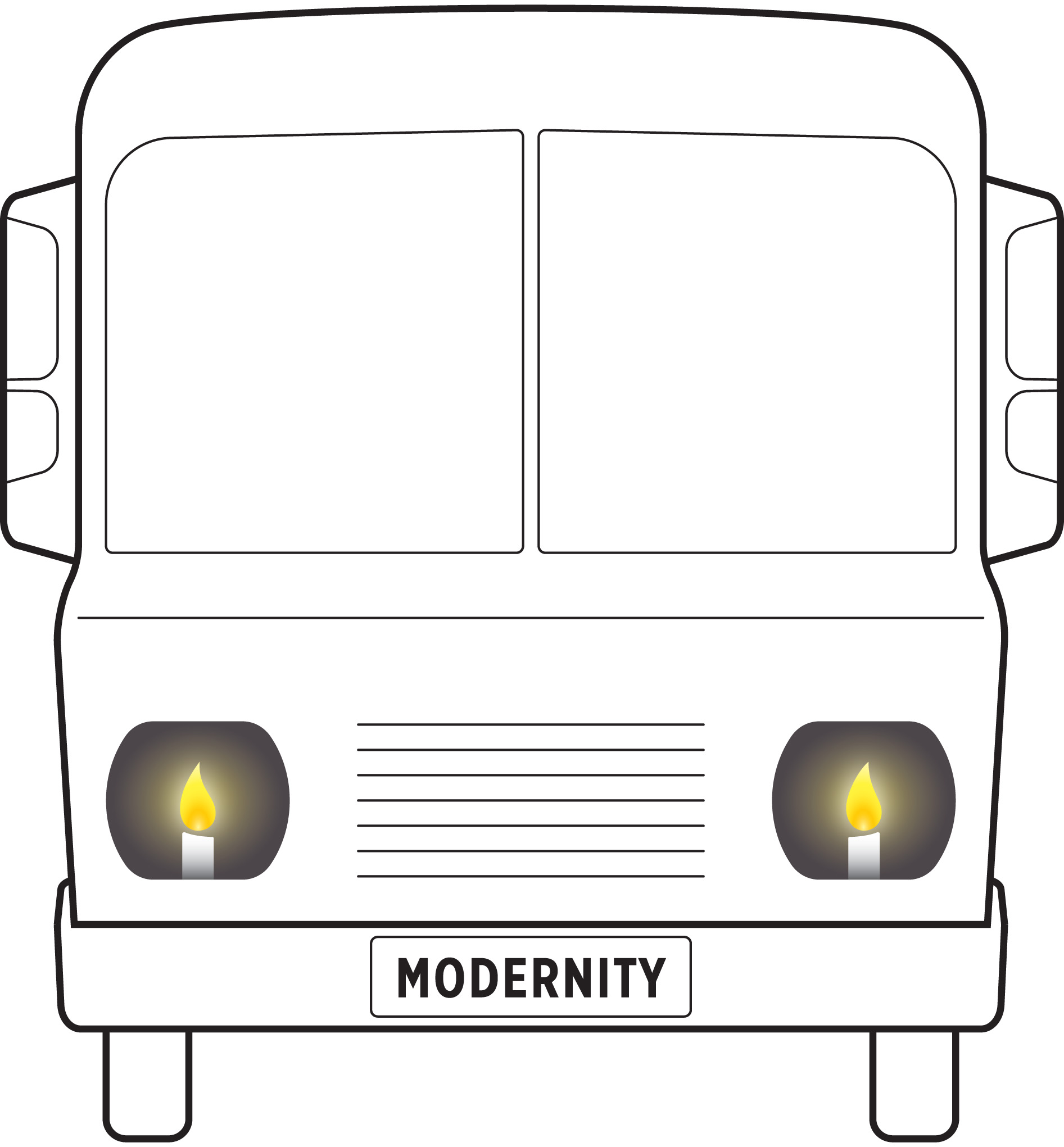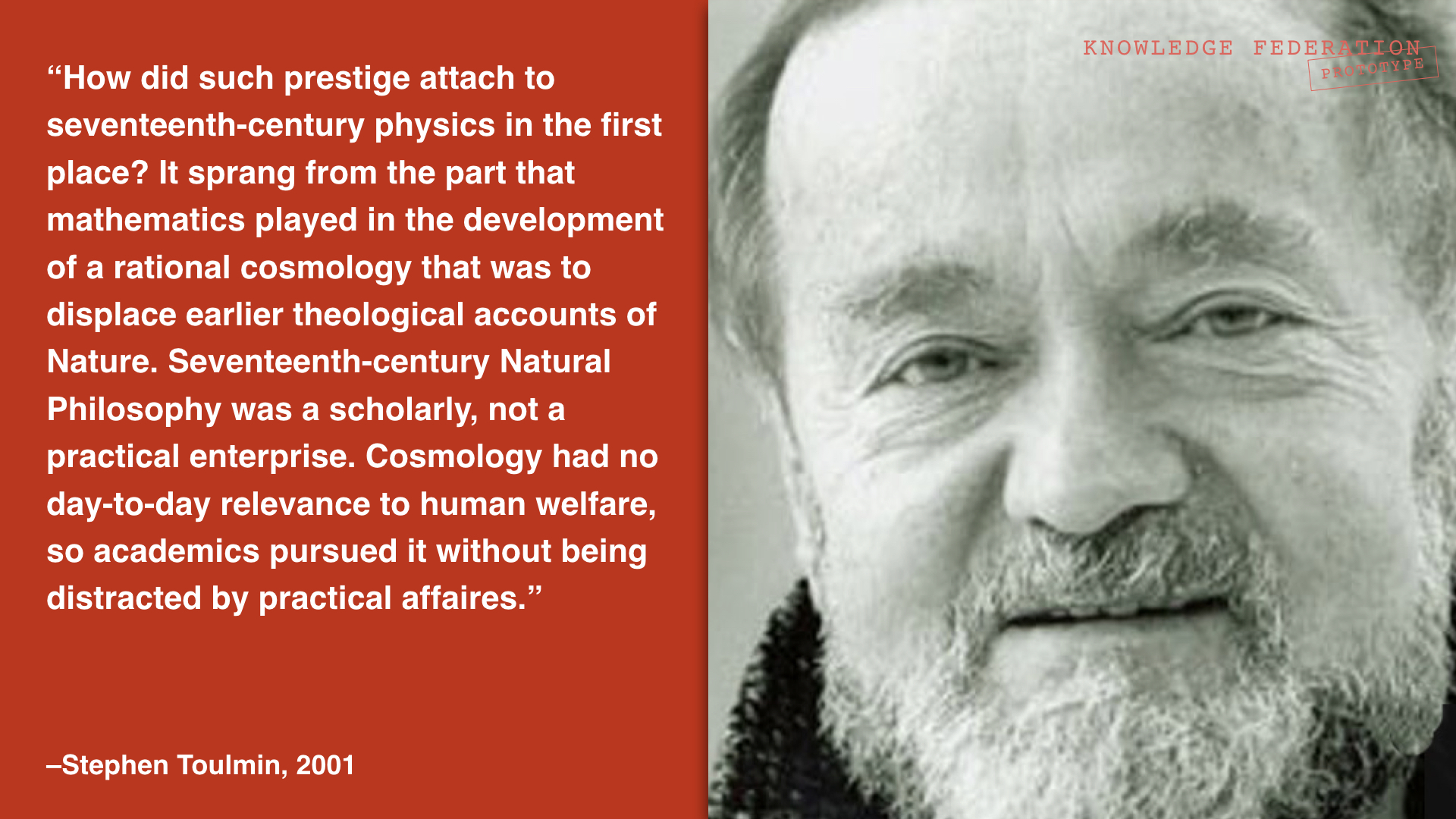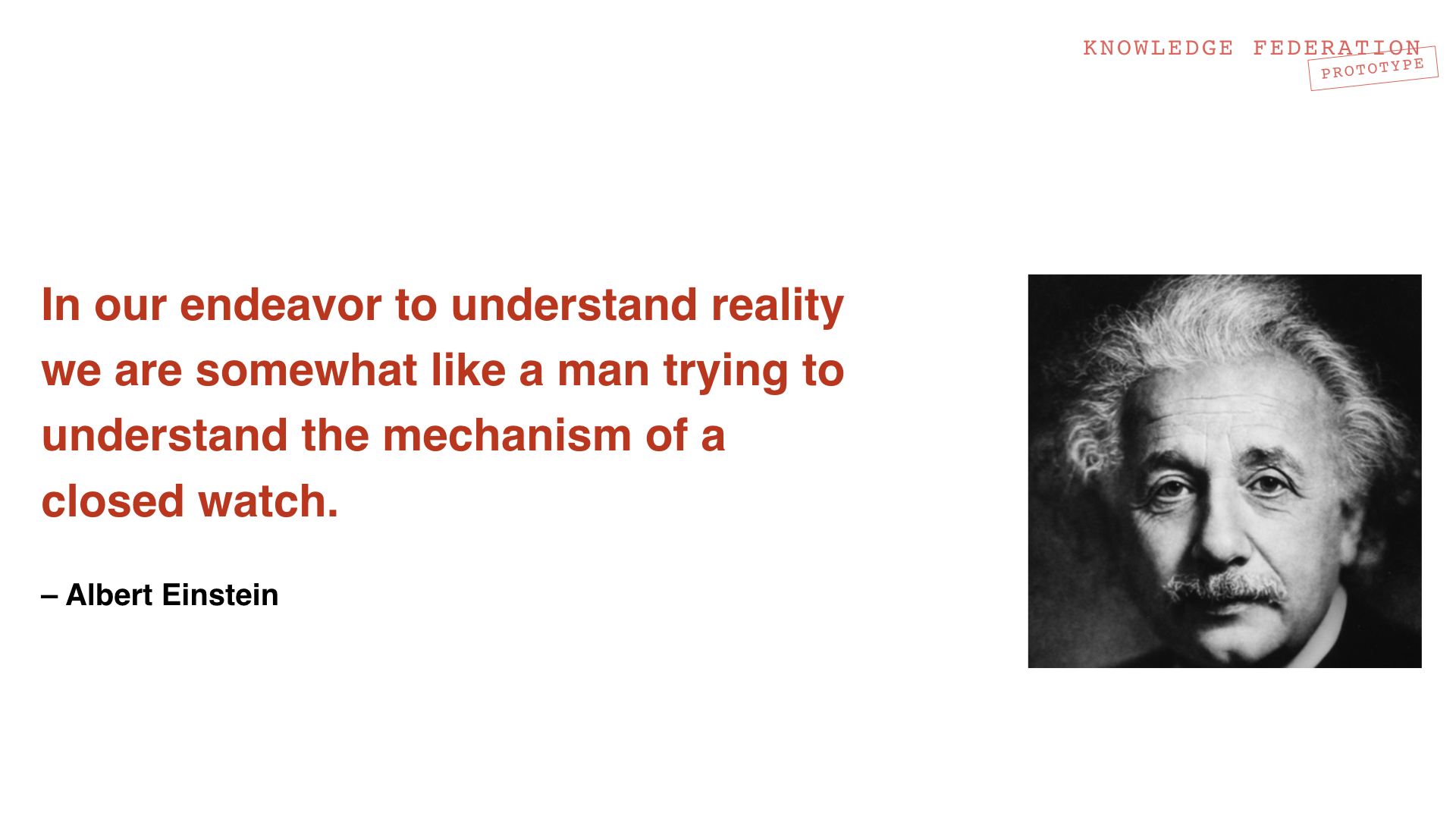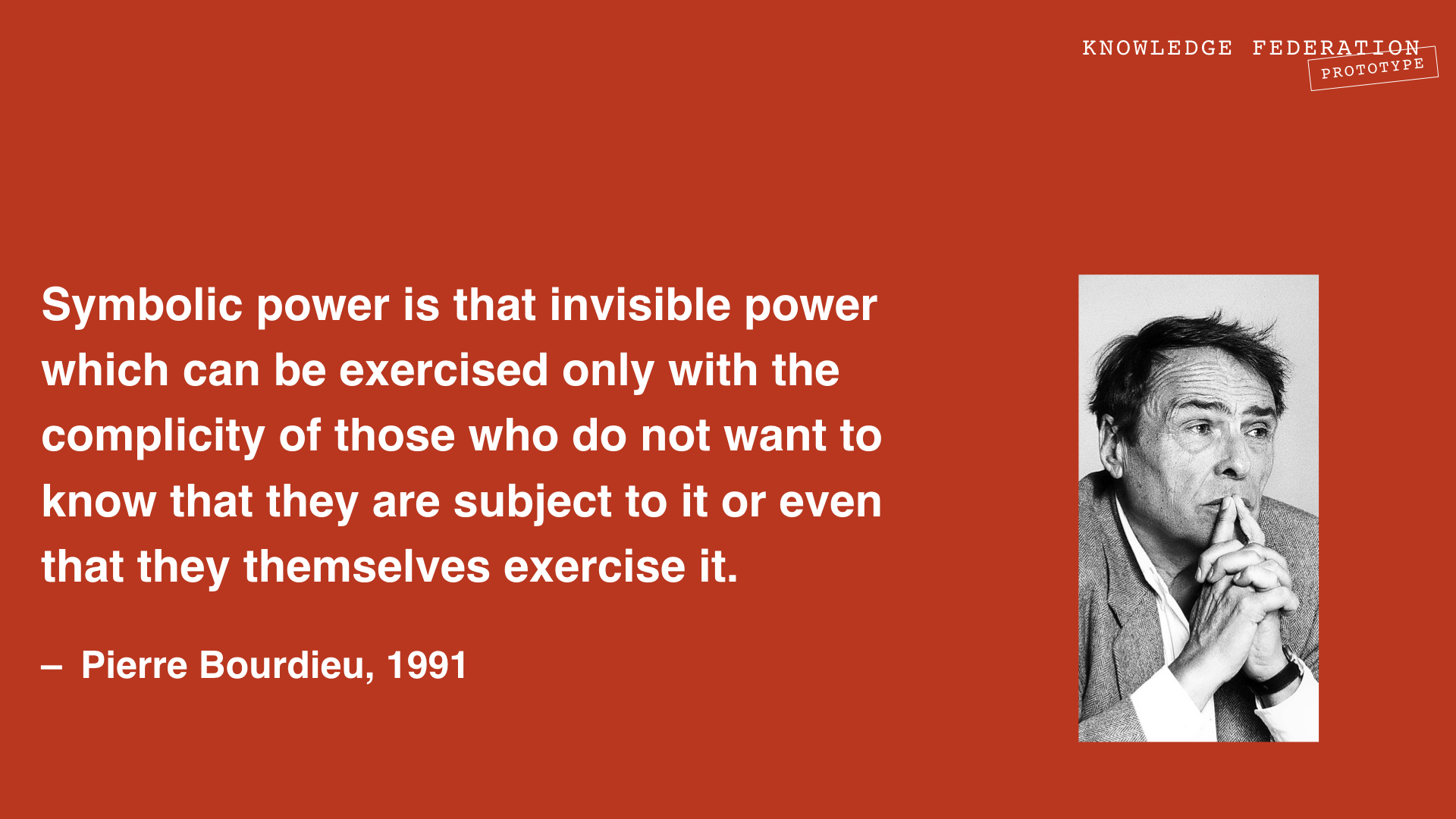Holotopia
Contents
HOLOTOPIA
An Actionable Strategy
Imagine...
You are about to board a bus for a long night ride, when you notice the flickering streaks of light emanating from two wax candles, placed where the headlights of the bus are expected to be. Candles? As headlights?
Of course, the idea of candles as headlights is absurd. So why propose it?
Because on a much larger scale this absurdity has become reality.
The Modernity ideogram renders the essence of our contemporary situation by depicting our society as an accelerating bus without a steering wheel, and the way we look at the world, try to comprehend and handle it as guided by a pair of candle headlights.
Scope
"Act like as if you loved your children above all else",Greta Thunberg, representing her generation, told the political leaders at Davos. Of course the political leaders love their children—don't we all? But what Greta was asking them to do was to 'hit the brakes'; and when the 'bus' they are believed to be 'driving' is inspected, it becomes clear that its 'brakes' too are missing. The job of the politicians is to keep the 'bus on course' (the economy growing) for yet another four-year term. Changing the 'course', or the system, is well beyond what they can do, or even conceive of.
The COVID-19 pandemic may require that we update some of our systems, and ways in which we collaborate—now.
So who, what institution or system, will lead us through our next evolutionary task—where we will learn how to recreate the systems in which we live and work; first in knowledge work, and then beyond?
Both Jantsch and Engelbart believed that "the university" would have to be the answer; and they made their appeals accordingly. But the universities ignored them—just as they ignored Bush and Wiener before them, and others who followed.
Why?
Isn't restoring agency to information and power to knowledge a task worthy of academic attention?
It is tempting to conclude that the university institution followed the general trend, and evolved as a power structure. But to see solutions, we need to look at deeper causes.
We readily find them in the way in which the university institution developed.
The academic tradition did not originate as a way to practical knowledge, but to freely pursue knowledge for its own sake, in a way that is disciplined only by the knowledge of knowledge (what we learned about the meaning and purpose of information and knowledge, and about their relationship with truth and reality), which the academic tradition has been developing since antiquity. Wherever the free-yet-disciplined pursuit of knowledge took us, we followed. And as we pointed out in the opening paragraphs of this website, by highlighting the iconic image of Galilei in house arrest,
it was this free pursuit of knowledge that led to the last "great cultural revival".
We asked:
Could a similar advent be in store for us today?
The key to the answer is in the state of the art of the knowledge of knowledge; and that's what we here focus on.
To reach an answer, we follow the lead that Stephen Toulmin left us in the above excerpt, quoted from his last book, "Return to Reason". At the point where the modern university was taking shape, it was the Church and the tradition that had the prerogative of telling the people how to conduct their daily affairs and what to believe in. And as the image of Galilei in house arrest might suggest—they held onto that prerogative most firmly! But the censorship and the prison could not stop an idea whose time had come. They were unable to prevent a completely new way to explore the world to transpire from astrophysics, where it originated, and transform first our pursuit of knowledge—and then our society and culture at large.
It is therefore natural that at the universities we consider the curation of this approach to knowledge to be our core role in our society. At the universities, we are the heirs and the custodians of a tradition that has historically led to some of the most spectacular evolutionary leaps in human history. Naturally, we remain faithful to that tradition. We do that by meticulously conforming to the methods and the themes of interests of mathematics, physics, philosophy, biology, sociology, philosophy and other traditional academic disciplines, which, we believe, embody the highest standards of knowledge of knowledge. People can learn practical skills at professional schools. It is the university education and the university education alone that can give them up-to-date knowledge of knowledge—and with it the ability to pursue knowledge in the right way in any domain of interest.
We must ask:
Can the evolution of the academic tradition continue still further?
Could it once again give us a completely new way to explore the world?
Can the free pursuit of knowledge, curated by the knowledge of knowledge, once again lead to "a great cultural revival" ?
Can "a great cultural revival" begin at the university?
Diagnosis
I the course of our modernization, we have made a fundamental error—whose disastrous long-term consequences cannot be overestimated.
This error has subsequently been detected and reported, but not corrected.
From the traditional culture we have adopted a myth far more disruptive of modernization than the creation myth.
This myth is that "truth" means "correspondence with reality". And that the purpose of information, and of our pursuit of knowledge, is to "know reality objectively", as it truly is.
During modernization, we only learned to use this myth in a new way. As the members of the homo sapiens species, we've been told, we have the evolutionary prerogative to reach "objective" or "true" knowledge by using our rational faculties (not by Divine revelation)—and based on it, to direct our personal affairs and our society, by making rational decisions. Give us a "true picture of reality"—and we'll know what is best for us, and what is to be done.
It may take a moment of reflection to see how much this myth permeates our popular culture, our society and institutions; how much it marks "the relationship we have with information"—in all its various manifestations.
The 20th society science and philosophy discredited and disowned this myth.
It has turned out that it is simply impossible to open up the 'mechanism of nature', and verify that our ideas and models correspond to the real thing!
The "reality", the 20th century's scientists and philosophers found out, is not something we discover; it is something we construct.
Our "construction of reality" turned out to be a complex and most interesting process, in which our cognitive organs and our society or culture interact. From the cradle to the grave, through innumerably many "carrots and sticks", we are socialized to organize and communicate our experience in a certain specific way.
The vast body of research, and insights, that resulted in this pivotal domain of interest, now allows us and indeed compels us to extend the power structure view of social reality a step further, into the cultural and the cognitive realms.
In "Social Construction of Reality", Berger and Luckmann left us an analysis of the social process by which the reality is constructed—and pointed to the role that "universal theories" (which determine the relationship we have with information) play in maintaining a given social and political status quo. An example, but not the only one, is the Biblical worldview of Galilei's persecutors.
To organize and sum up what we above all need to know about the nature of socialization, and its relationship with power, we created the Odin–Bourdieu–Damasio thread, consisting of three short real-life stories or vignettes. (The threads are a technical tool we developed based on Vannevar Bush's idea of "trails"; we call them "threads" because we further weave them into patterns.) These insights are so central to holotopia, that we don't hesitate to summarize them also here, however briefly.
The first, Odin the Horse story, illustrates the turf behavior of animals.
The second story is how Pierre Bourdieu became a sociologist, by observing the modernization of Algerian society during and after the 1954-62 Algerian War of Independence. And by condensing his insights into a theory—about how socialization operates.
Our point here will bed to imagine a turf, analogous to the grass meadow inhibited by Odin the Horse and his herd—but far more complex; as much more, as our culture is more complex than the culture of the horses.
Bourdieu used interchangeably two keywords—"field" and "game"—to refer to this "turf". Calling it a field may invokes the association with something akin to a magnetic field, which orients our seemingly random or "free" behavior, without us noticing. Calling it a game suggests something that structures or "gamifies" our social existence, by giving everyone a certain role. Those roles, Bourdieu observed, tend to be transmitted from one body to the next—usually without anyone noticing the subtle power play, or "turf behavior", they engender (Bourdieu used the keyword "habitus" to point to the embodied predispositions to act and think in a certain way, which correspond to a role). Everyone bows to the king, and you naturally do that too. For the socialized experience—that what we perceive as "reality", both social and natural, is the only possible one (which plays a key role in socialization, determining the very structure and the rules of the game), Bourdieu used the keyword doxa.
Antonio Damasio, as cognitive neuroscientist, completes this thread by explaining that we, humans, are not the rational decision makers we believed we were. That each of us has an embodied cognitive filter, which decides what options we can rationally even consider. Damasio explained why the possibility of taking off our pajamas and running into the street naked is not as a rule rationally considered. He completes the thread by showing how our culture may serve as a structured 'turf', which encodes the turf struggles of generations before us—while keeping us in place, unable to question or even see the absurdity of it all, and our role in it.




